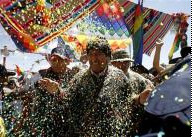Bolivia's Morales leads march over new constitution
October 13, 2008 - Reuters
By David Mercado
CARACOLLO, Bolivia (Reuters) - Bolivian President Evo Morales joined thousands of peasant farmers and leftist activists on Monday at the start of a 124-mile (200-km) march to demand a referendum on a controversial new constitution.
Morales, Bolivia's first indigenous president, says the new constitution will give more political power to the country's downtrodden Indian majority and entrench his leftist economic reforms.
However, the new constitution has met fierce opposition and Morales needs the support of Congress to advance the project, which lies at the heart of a bitter power struggle between the former coca farmer and rightist opponents based in the East.
A referendum must be held to enact the new constitution but it is up to Congress to call such a vote. Morales' Movement Toward Socialism party controls the lower house but the opposition controls the Senate.
Some 10,000 people gathered for the start of the march in the highland town of Caracollo, but Morales said there would be "more than a million" by the time the caravan arrived in the administrative capital La Paz, where Congress is deciding whether to call a referendum to vote on the constitution.
"This march is about refounding Bolivia," Morales said in a speech before the procession began, accompanied by marching bands and peasant farmers from across the country.
Morales, a close ally of Venezuelan President Hugo Chavez, wants the referendum on the new constitution to be held early next year, but he must win the support of opponents in Congress to get the two-thirds majority he needs to approve the ballot.
An elected constitutional assembly approved the country's new constitution late last year in a session boycotted by the opposition, which rejects the document.
Morales' opponents, concentrated in wealthier, natural-gas rich regions say the draft is racist. They are also opposed to his plans to redistribute large landholdings among poor peasant farmers and want greater regional autonomy from central government.
(Writing by Carlos Quiroga and Helen Popper; Editing by Cynthia Osterman)
